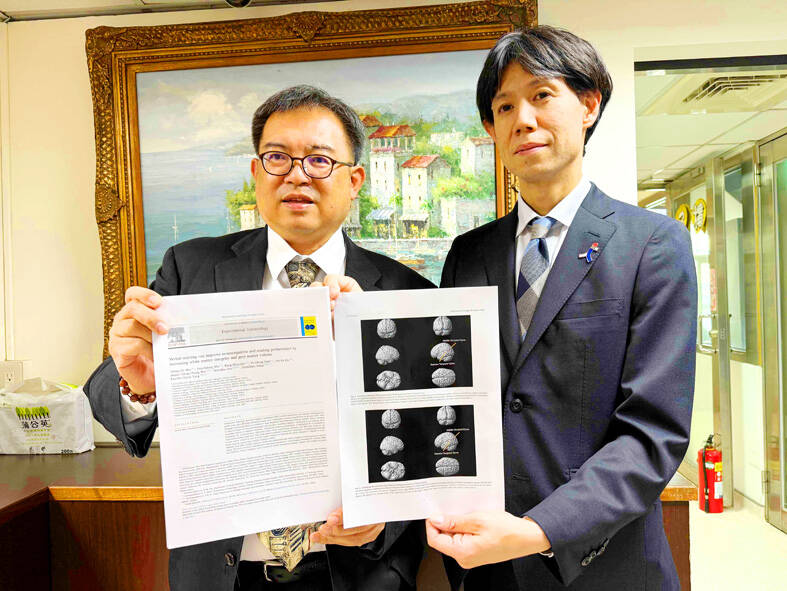Joint research by Taichung-based Wizcare Hospital and Japan’s Osaka University found that linguistic training helps activate brain functions in elderly people.
The hospital on Nov. 30 announced its findings from research on the use of linguistic training in elderly people’s rehabilitation, which showed that ongoing primary reading could activate their brains.
The National Tsing Hua University (NTHU), Taichung Veterans General Hospital (TVGH) and the Chung Shan Medical University also participated in the research, and the results are to be published in the geriatrics journal Experimental Gerontology this month, Wizcare Hospital superintendent Hsu Ching-chi (許景琦) said.

Photo: Tsai Shu-yuan, Taipei Times
The research was funded by the Japan Society for the Promotion of Science, thanks to Osaka University professor Toshiharu Nakai’s efforts in applying for a grant, he said.
The research was conducted from 2022 to last year, where 40 healthy Japanese aged 65 to 90 were divided into two groups. The experimental group was required to read Japanese for one hour every day for a month, Hsu said.
As linguistic training had proven to significantly slow down the deterioration of cognitive functions in people with Alzheimer’s disease, Hsu said he assumed linguistic training could benefit healthy old people as well.
Nuclear magnetic resonance examination showed that the gray and white matter in the brains of participants from the experimental group significantly increased, Hsu said.
NTHU Artificial Intelligence Center professor Yang Fan-pei (楊梵孛) said the gray matter — where cerebral neurons are located — and white matter, which is responsible for neurotransmission, would thin out and even disappear in people with cognitive impairment.
However, the research showed that the gray and white matter could grow thick in elderly people who read texts and undergo pronunciation training for as long as one month, she said.
Combining easily-pronounced words with harder ones could achieve that effect, Yang said, adding that activities such as singing or playing games also help delay brain degeneration in the elderly.
TVGH Family Medicine Department director Chu Wei-min (朱為民) said when he was studying in Japan, he had noticed that Japanese nursing homes provided cognitive training and physical activity courses for residents with early dementia.
Courses on simple mathematics and aerobic exercise or strength training were used to enhance brain and body functions, effectively delaying dementia progression and improving mild cognitive impairment, he said.

Chinese Nationalist Party (KMT) Chairman Eric Chu (朱立倫), spokeswoman Yang Chih-yu (楊智伃) and Legislator Hsieh Lung-chieh (謝龍介) would be summoned by police for questioning for leading an illegal assembly on Thursday evening last week, Minister of the Interior Liu Shyh-fang (劉世芳) said today. The three KMT officials led an assembly outside the Taipei City Prosecutors’ Office, a restricted area where public assembly is not allowed, protesting the questioning of several KMT staff and searches of KMT headquarters and offices in a recall petition forgery case. Chu, Yang and Hsieh are all suspected of contravening the Assembly and Parade Act (集會遊行法) by holding

PRAISE: Japanese visitor Takashi Kubota said the Taiwanese temple architecture images showcased in the AI Art Gallery were the most impressive displays he saw Taiwan does not have an official pavilion at the World Expo in Osaka, Japan, because of its diplomatic predicament, but the government-backed Tech World pavilion is drawing interest with its unique recreations of works by Taiwanese artists. The pavilion features an artificial intelligence (AI)-based art gallery showcasing works of famous Taiwanese artists from the Japanese colonial period using innovative technologies. Among its main simulated displays are Eastern gouache paintings by Chen Chin (陳進), Lin Yu-shan (林玉山) and Kuo Hsueh-hu (郭雪湖), who were the three young Taiwanese painters selected for the East Asian Painting exhibition in 1927. Gouache is a water-based

Taiwan would welcome the return of Honduras as a diplomatic ally if its next president decides to make such a move, Minister of Foreign Affairs Lin Chia-lung (林佳龍) said yesterday. “Of course, we would welcome Honduras if they want to restore diplomatic ties with Taiwan after their elections,” Lin said at a meeting of the legislature’s Foreign Affairs and National Defense Committee, when asked to comment on statements made by two of the three Honduran presidential candidates during the presidential campaign in the Central American country. Taiwan is paying close attention to the region as a whole in the wake of a

OFF-TARGET: More than 30,000 participants were expected to take part in the Games next month, but only 6,550 foreign and 19,400 Taiwanese athletes have registered Taipei city councilors yesterday blasted the organizers of next month’s World Masters Games over sudden timetable and venue changes, which they said have caused thousands of participants to back out of the international sporting event, among other organizational issues. They also cited visa delays and political interference by China as reasons many foreign athletes are requesting refunds for the event, to be held from May 17 to 30. Jointly organized by the Taipei and New Taipei City governments, the games have been rocked by numerous controversies since preparations began in 2020. Taipei City Councilor Lin Yen-feng (林延鳳) said yesterday that new measures by